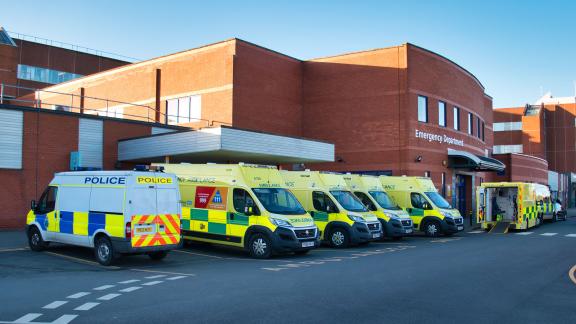System-wide pressures continue to challenge NHS

Once again as I write this, several of our members are under extraordinary pressure, with many operating at the highest levels of escalation in emergency care and across wider healthcare settings. The reasons? They’re nothing new - high levels of Covid tipping the balance on the already overstretched and overstrained services in hospitals and communities across Wales.
We’ve been working hard to communicate the reality and complexity of system pressures to the media, MSs and wider stakeholders The challenges are immediate but the solutions are much longer term, requiring sustained investment and planning.
As we know, Covid hospital admissions have been rising, with almost 1,500 patients with Covid in our hospitals in Wales at the time of writing. This is roughly the equivalent of Wales' biggest hospital, the University Hospital of Wales, being taken out of the system - the highest admissions have been since March 1, 2021. Pressure on GPs and community services is also extremely high, but perhaps less visible to most of the public.
Although the percentage of patients primarily being treated for Covid is not as high as in previous waves, we know the wider impact of having large numbers of Covid patients in hospitals is severe and has implications on patients' treatment options. Having to complete intensive infection prevention and control measures and ensure social distancing to minimise hospital-acquired infection is extremely time consuming; reducing staff's efficiency and capacity to treat more patients at a time when the NHS is experiencing extremely high levels of demand. Much of this demand comes from the worsening of patients’ conditions over time due to countless postponements in non-urgent care. With the military support for the ambulance service having ended and new recruits not operational until May, we will no doubt see the impact from this too in the coming month.
Numbers of Covid patients in critical care are relatively low, but even a small increase can have huge repercussions on other patients' treatment, including the ability to undertake planned operations where critical care facilities may be needed afterwards for a patient’s recovery.
Perhaps most importantly, with such high levels of community transmission of the virus, the impact on staff absences is unavoidable, further reducing capacity. This not only causes considerable problems for the NHS, but also the social care workforce, further impacting patient flow through hospitals and our ability to care for people in the community with other conditions. Some health boards are telling us that the care market has nearly collapsed in some areas, with large numbers of care homes closed to new residents because of Covid outbreaks or capacity issues. Working with local authority partners and government on this issue will continue to be a key priority for us.
We're pleased to see the continuation of the requirement to wear face masks in health and care settings and regular lateral flow testing of staff who live and work in our communities. However, the reduction of testing in the community at a time of record high Covid rates is concerning. When Covid transmission escalates to these levels, that's when it's most likely new variants or subtypes will emerge. At a minimum it's vital we maintain testing infrastructure so we can scale up activity in the likely event of a new variant emerging.
Despite most legal Covid measures being lifted in Wales, we must all take responsibility for our actions and continue to take protective measures where possible, including taking up the offer of vaccination. The spring booster programme began two weeks ago in Wales, and it will be key to boost the immunity of those who are eligible – the most vulnerable in our society.
This system-wide challenge to provide care is starting to affect the health of our communities, with higher numbers of very sick people presenting in A&E and compromised quality of life for the thousands awaiting treatment. The rapidly rising demand for urgent and emergency care threatens to slow down NHS leaders’ attempts to recover the elective care backlog, and we know to improve the situation in the NHS, all parts of health and social care must work together.
Now more than ever we need clear and consistent messaging across all sectors to successfully engage with the public (see our latest publication, below). Public expectations do not reflect the current capacity limitation and restrictions on the NHS as more is being demanded of it. Our calls for a Deal for Health and Wellbeing are as relevant now as they will ever be and we must take our learnings from the pandemic forward to harness this opportunity.
As a starting point in the short term, we must all do our bit to raise awareness of the alternatives to A&E – 111 online, community pharmacies, minor injury units – to encourage the public to access the right service in the right place at the right time.
Leaders from across public service need to engage with the public on the future of health and care services so they understand what the NHS can deliver in the future as demand increases and people’s needs become more complex.
The workforce has been under continued pressure, with sickness absence, stress, well-earned annual leave and the need to self-isolate compounding the current situation. It goes without saying that we are incredibly grateful for the work that everyone involved in health, care, the voluntary sector and carers in communities are doing to provide the best possible care to our families and loved ones at this incredibly challenging time.



